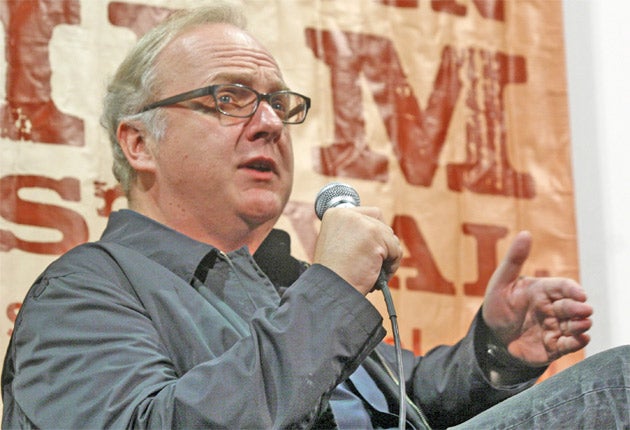George Hickenlooper: Film-maker best known for his documentary about the making of ‘Apocalypse Now’

A director whose eclectic body of work included documentaries and features, George Hickenlooper suffered a heart attack on his way to the US premiere of his latest film, Casino Jack, starring Kevin Spacey as the disgraced lobbyist Jack Abramoff. It had debuted in September at the Toronto Film Festival to strong reviews and audience reaction, and it seemed at last that Hickenlooper had managed to merge the two strands of his work into one potentially successful film.
Hickenlooper was best known for his second film, Hearts Of Darkness: A Film-maker's Apocalypse (1991), on which he was credited as co-director. Originally produced for television, it won Hickenlooper an Emmy. The film detailed the tribulations endured during the making of Francis Ford Coppola's Apocalypse Now, and drew an explicit parallel between film-making and war, as well as between Coppola and the character of Kurtz played by Marlon Brando. He first met Coppola when, as a 17-year-old, he had been thrown off the set of Steven Spielberg's Poltergeist; undeterred, Hickenlooper continued on to American Zoetrope, wandered into Coppola's office, presented him with a caricature he'd drawn and spent the day with the director.
Hickenlooper was born in 1963 in St Louis, his father a playwright, his mother an actress; his interest in film was sparked seeing his great-uncle Leopold Stokowski conducting and talking to Mickey Mouse in Walt Disney's 1941 classic, Fantasia. It blossomed after moving to California, where his mother ran a guerrilla theatre group; one day his father snuck off from a peace rally to take him to a double bill of The Wild Bunch and The Last Picture Show.
After they returned to St Louis, Hickenlooper was given a movie camera for his 13th birthday; at St Louis University High School he was part of a film-making group called The Splicers. After graduating in 1986 from Yale in history and film studies, he moved to Los Angeles and interned with Roger Corman. His first film, Art, Acting and the Suicide Chair (1988) was a documentary about Dennis Hopper, sparking his interest in Apocalypse Now. He followed Hearts Of Darkness with the less bombastic but equally impressive Picture This (1991), about Peter Bogdanovich and The Last Picture Show. That year he also published Reel Coversations, one of the best cinema interview books.
He ventured into features with a Civil War horror film, The Killing Box (1993), and a short film, Some Folks Call It Sling Blade (1994), written by and starring Billy Bob Thornton, who would have a hit directing the full-length version two years later. After making the pilot for an unsold TV series, Crosstown Traffic (1995), Hickenlooper wrote and directed two personal films which reflected his own career. Low Life (1995) tells the story of a Yale-educated writer trying to make it in Hollywood, while in Dogtown (1997) an unsuccessful actor returns to his Missouri hometown, where he is greeted as a visiting star. The thriller Persons Unknown (1996) deserved a bigger audience, as did his adaptation of an unproduced Orson Welles screenplay about politics, The Big Brass Ring (1997). Hickelooper finished this productive period with another fine documentary, about the maverick director Monte Hellman.
He remained attracted to stories of creative failure and artistic celebrity. In The Man From Elysian Fields (2001) Andy Garcia plays an unsuccessful writer who takes work as a escort and falls in love with the wife of a more successful writer. The 2003 documentary Mayor Of Sunset Strip dealt with Rodney Bingenheimer, a Zelig-type celebrity on the fringes of Hollywood. In 2006 he directed Factory Girl, in which Sienna Miller's celebrity lent an air of realism to her performance as the doomed Andy Warhol "superstar" Edie Sedgwick. Hickenlooper's difficulties with the film's producer, Harvey Weinstein, may have spurred his next project, Speechless (2008) a collection of videos made by actors and directors in support of the Writers Guild strike.
Hickenlooper had reacted to his parents' radicalism by adopting a right-wing stance, which had fully eroded by the time he made Speechless. His 2009 film Hick Town followed his cousin John Hickenlooper, mayor of Denver, as he prepared for the 2008 Democratic Convention and shared the stage at Mile High Stadium with Barack Obama.
He continued Hick Town as a TV series which followed his cousin as he ran for governor. George had stopped in Denver to share the election's finish with his cousin when he died in his sleep; four days later John was elected.
George Hickenlooper, film-maker: born St Louis, Missouri 25 March 1963; married (one son); died Denver, Colorado 29 October 2010.
Join our commenting forum
Join thought-provoking conversations, follow other Independent readers and see their replies
Comments
Bookmark popover
Removed from bookmarks